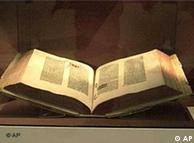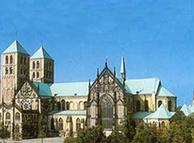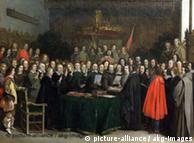History | 16.11.2009
Peace of Westphalia ends the 30 Years' War
A conflict over religious freedom sparked the war, but it soon became very clear that two large European powers, France and Sweden, also had political reasons for getting involved. They wanted to extend their influence in the central part of the continent, and limit the power of the German emperor. The emperor, meanwhile, didn't just have a war with Europe's major armies to contend with, but also the attempts by several German princes to gain more autonomy for themselves.
From Catholic to Christian continent
 Bildunterschrift: Großansicht des Bildes mit der Bildunterschrift: The Word of God - the Bible
Bildunterschrift: Großansicht des Bildes mit der Bildunterschrift: The Word of God - the Bible
The Thirty Years' War played out mainly in the northern and eastern parts of Germany, where it wrought significant destruction. When it ended, it brought religious freedom to Catholics, Protestants and Calvinists. As was the case with the Religious Peace of Augsburg in 1555, people were guaranteed the freedom to choose their confession. Additionally, peasants were granted the right to leave their land if the religion imposed by the prince or ruler didn't suit them.
This freedom became part of basic civil rights in Europe, and weakened the power of the Catholic Church. Rome remained a powerful institution, but Protestants and Calvinists began amassing more influence. Over the centuries that followed, a Roman Catholic continent transformed into a Christian continent.
European history was written first in Muenster, where the first signatures were placed on the Peace of Westphalia in May 1648, and then again in Osnabrueck. For the first time, the states of Europe looked at the continent as a whole; they wanted to take on responsibility for the continent together. It was as if a "Conference on Security and Cooperation in Europe" was being held in Muenster and Osnabrueck.
The newly-created order was guaranteed by the large powers and brought independence to both Switzerland and the Netherlands. Sweden was granted rule over the bishoprics of Bremen and Verden, and Brandenburg-Prussia was given land that would soon see it emerge as simply Prussia. France also realized its wartime goals, and was granted territories that allowed it to escape the stranglehold of the powerful Habsburgers.
Foundation for the Federal Republic
 Bildunterschrift: Großansicht des Bildes mit der Bildunterschrift: St. Paul's Cathedral, Muenster
Bildunterschrift: Großansicht des Bildes mit der Bildunterschrift: St. Paul's Cathedral, Muenster
Many of the terms of the Peace of Westphalia were to the detriment of the German Emperor. At the same time, the rights of the German princes were strengthened. They were now permitted to have a voice in matters that affected the "Holy Roman Empire of the German Nation" - things such as war and peace, taxes and laws. They could form alliances with foreign powers, as long as this was not against the interests of the emperor and the empire.
Because of this, the German regional states developed into independent subjects of civil law. If the opportunity presented itself, they could involve themselves in European power politics. This increase in the princes' power is one of the factors that contributed to the federal structure in Germany, where state premiers watch over the rights that are due the states.
Guarantors Sweden and France
Sweden and France acted as guarantors for the Peace of Westphalia. None of the terms could be changed without their consent. For the Germans, who lived in more than 300 independent small states, this had one consequence: if they wanted to unify to become a single state, they would need the permission of France and Sweden.
The maintenance of the status quo in central Europe was important for the security of the European states, who wanted to avoid having an overly powerful German emperor in the heart of the continent. The Germans therefore no longer decided their fate themselves - they were dependent on the interests of their neighbors. It was a condition that again played a role during the reunification of the two German states in 1990. It wasn't for nothing that German unity was a part of European integration.
Author: Matthias von Hellfeld (dc)
Editor: Andreas Illmer

Comments